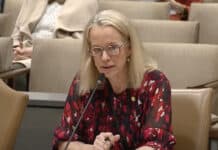“Can the Edina Schools Be Saved?” That’s the question I pose in the just-out Spring 2019 issue of Thinking Minnesota.
This new article updates developments in Edina’s once-fabled public schools since my earlier pieces on the topic appeared. (Available here and here.) Troubles have plagued the district since 2013, when it replaced its mission of academic excellence for all with a social agenda.
“Six years after officials at Edina Public Schools (EPS) decided to view ‘all teaching and learning through the lens of racial equity,’” the article begins, “it’s clear the district administration has taken its eye off the ball of academic excellence”:
Today, EPS is experiencing across-the-board test score declines—from third-grade reading to ACT benchmarks in math, reading and science—along with an exodus of families the district can’t afford to lose.
Edina’s experience provides a cautionary tale of what can happen when a school district renowned for academic excellence embraces a social mission that requires viewing students, first and foremost, not as individuals but as members of racial groups.
What have been the real-world educational consequences of viewing “all teaching and learning” through the lens of “equity,” as EPS has done since 2013? These include:
- An embrace of an experimental instructional approach—“personalized learning”(PL)—as a vehicle to advance the district’s social agenda. PL represents an attempt to educate students of widely differing readiness and abilities in the same demographically balanced classrooms, and differs greatly from “the structured education system that has been in place for generations,” according to the EPS web site. Unfortunately, evidence of PL’s educational effectiveness is “very weak,” according to the RAND Corporation.
- A growing exodus of families who are choosing both private and other public schools for their students. In 2018-19, the number of families who open-enrolled out of Edina into other school districts increased 28 percent over the previous year. The consequences for EPS’s budget, going forward, are deeply troubling.
- Continued promotion of a “racial identity” narrative in and out of the classroom. The administration’s recommended “equity resources for families,” for example, include a book entitled White Fragility: Why It’s So Hard for White People to Talk about Racism and an essay that advises white readers that—regardless of how hard they try to reject racism—they must “recognize that you’re still racist. No matter what.”
The goal of EPS leaders’ 2013 decision to view “all teaching and learning” through a “lens of racial equity” was to close the district’s racial learning gap. That hasn’t happened, though the Edina schools have been transformed in the process. In too many cases, a social agenda is now taking precedence over instruction in reading, math and science.
Today, Edina parents are coming together across the political spectrum to demand accountability and transparency from district leaders. “I don’t care about people’s politics,” one parent explained. “I care about them as a parent, a neighbor and a citizen. We all care about our kids.”
“Sometimes it feels as if it’s the administration against the rest of us,” the parent adds.
My new article urges Edina parents and citizens to seize two upcoming opportunities to ensure that EPS returns to academic rigor and a policy of viewing students as individuals, rather than focusing on skin color. This summer, the Edina School Board will adopt a new five-year strategic plan and in November, school board elections will take place.
Edina residents should demand accountability from a district administration that appears to be seriously out-of-sync with the citizens they are supposed to serve.
Katherine Kersten
Katherine Kersten, a writer and attorney, is a Senior Policy Fellow at Center of the American Experiment. She served as a Metro columnist for the Star Tribune (Minneapolis) from 2005 to 2008 and as an opinion columnist for the paper for 15 years between 1996 and 2013. She was a founding director of the Center and served as its chair from 1996 to 1998.

















